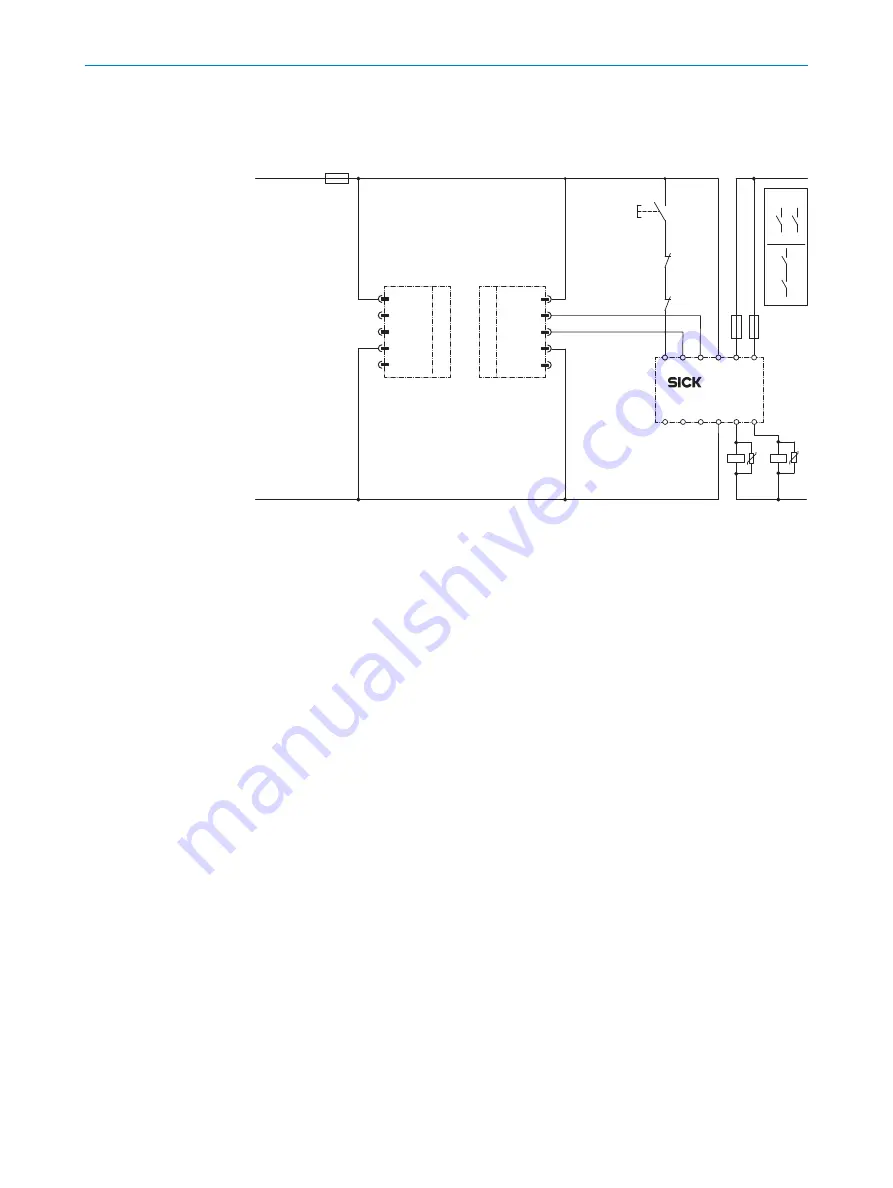
4.4.3
Connection diagrams
Connection diagram for RLY3-OSSD2 with restart interlock and external device moni‐
toring
1
2
4
3
5
2) PELV
r
S
ys
te
m conne
c
ti
on
+24 V DC
OSSD1
OSSD2
0 V
n.c.
1
2
4
3
5
s
S
ys
te
m conne
c
ti
on
+24 V DC
n.c.
n.c.
0 V
n.c.
F2 F1
+24 V DC
0 V DC
K1
K2
E243749/02/2020-07-10
R1
Y1
Y2
24
A2
14
S1
I1
I2
23
A1
13
RLY3-OSSD2
k2
z
k1
k2
k1
z
x
y
x
1)
y
F0
L+
L–
deTec2 Core
deTec4 Core
k2
k1
S1
Figure 17: Connection diagram for RLY3-OSSD2 with restart interlock and external device moni‐
toring
1)
Output circuits: These contacts must be incorporated into the control such that the
dangerous state is brought to an end if the output circuit is open. For categories 4 and 3,
they must be incorporated on dual-channels (x, y paths). Type 2 devices are suitable for
use up to PL c. Single-channel incorporation into the control (z path) is only possible with
a single-channel control and taking the risk analysis into account.
2)
SELV/PELV safety extra-low voltage.
•
Task
Connection of a deTec2 Core safety light curtain to a RLY3-OSSD2 safety relay.
Operating mode: With restart interlock and external device monitoring.
•
Mode of operation
When the protective field is clear, the OSSD 1 and OSSD 2 outputs carry voltage.
The system can be switched on when K1 and K2 are in a fault-free de-energized
position. The RLY3-OSSD2 is switched on by pressing S1 (pushbutton is pressed
and released). The outputs (contacts 13-14 and 23-24) switch the K1 and K2
contactors on. When the protective field is interrupted, the OSSD 1 and OSSD 2
outputs switch the RLY3-OSSD2 off. Contactors K1 and K2 are switched off.
•
Fault analysis
Cross-circuits and short-circuits of the OSSDs are recognized and lead to the
locking status (lock-out). A malfunction with one of the K1 or K2 contactors is
detected. The switch-off function is retained. In the event of manipulation (e.g.,
jamming) of the S1 pushbutton, the RLY3-OSSD2 will not re-enable the output
current circuits.
4.5
Testing plan
The manufacturer of the machine and the operating entity must define all required
checks. The definition must be based on the application conditions and the risk assess‐
ment and must be documented in a traceable manner.
PROJECT PLANNING
4
8014276/1DCM/2022-10-27 | SICK
O P E R A T I N G I N S T R U C T I O N S | deTec2 Core
25
Subject to change without notice
















































